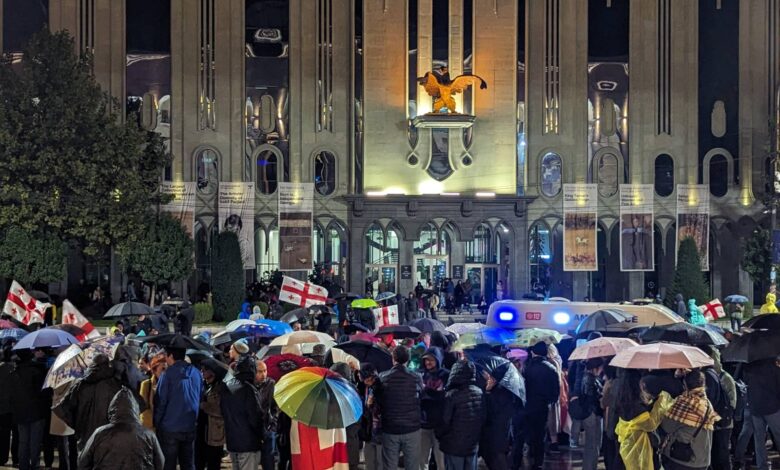
Detentions of Journalists Covering Tbilisi Rallies Draw Concerns
At least three journalists covering rallies in Tbilisi were briefly detained and later released in recent weeks, with one still facing administrative proceedings, drawing concerns that the detentions may be part of the ruling party’s broader pressure tactics.
Detentions come amid new stricter laws that make “blocking roads,” covering faces, or carrying prohibited items at rallies punishable by immediate administrative detention, and by up to a year in prison if repeated. Journalists have continued to cover daily rallies on Tbilisi’s Rustaveli Avenue, as demonstrators defy what critics call an attempt to outlaw peaceful protest.
The “demonstrative detentions” of reporters “serve to intimidate journalists so that they stop covering protest rallies and are unable to document violations of the rights of participants in these rallies,” the Charter of Journalistic Ethics, a non-state media self-regulatory body, said late on November 5.
The latest incident involved Liza Tsitsishvili, a reporter for the government-critical Formula TV, who was detained during the daily protest on Tbilisi’s Rustaveli Avenue on November 5. Video footage shows several police officers dragging her into a police car as she held what appears to be a microphone, while nearby journalists could be heard shouting that she’s a reporter. Tsitsishvili was released shortly afterward.
“I’m free, they apologized and released me because I’m a journalist. Thank you, friends. Mzia Amaghlobeli has been in prison for 300 days, so under these circumstances, it’s okay, nothing else matters, until the end,” Tsitsishvili wrote later on social media.
Earlier, on November 3, police detained Ninia Kakabadze, a journalist of Mediachecker, a local media group, as she was leaving the protest site and heading home. Kakabadze, 51, was taken to the Interior Ministry building and released shortly after. Online outlet Publika’s footage shows Kakabadze wearing her press badge, recording on her phone amid a heavy police presence as officers ordered protesters to clear the roadway.
“They brought me in with a large escort, like some notorious criminal,” Kakabadze said in a video address after her release, adding that police had refused to let her call her 12-year-old son, who was home alone, for nearly an hour, and had denied her the right to contact a lawyer.
During her November 4 court hearing, an Interior Ministry representative argued Kakabadze remained on the roadway after police attempted to restore traffic. Kakabadze denied the charge, saying she was not detained on the roadway and cited video footage supporting her claim. The court adjourned the hearing to November 12.
Earlier, on October 24, Publika reported that its journalist Mamuka (Basti) Mgaloblishvili, who had been covering the protests on Rustaveli Avenue, was also briefly detained near his home. According to the outlet, two police officers placed him in their car and questioned him to verify his identity, despite him presenting a press card. He was held for about 40 minutes before being released and driven home, after officers reportedly told him, “We mistook you for someone else.”
On November 5, the Council of Europe’s Platform for the Protection of Journalism and Safety of Journalists issued a level-two alert over Kakabadze’s detention, urging Georgian authorities to “drop all charges against Ninia Kakabadze” and “end the arrests of journalists covering protests.” The Platform identified the state as the “source of the threat.”
More than a hundred protesters have been detained since the disputed parliament fast-tracked stricter protest laws in mid-October. One protester, Zurab Menteshashvili, was placed in pre-trial detention under criminal charges as police allege he repeatedly “blocked the road” during the rally.
Rustaveli Avenue has been blocked nightly since November 28, 2024, when the Georgian Dream government announced halting Georgia’s EU accession efforts. The ruling party has recently pledged “methodical and systemic” moves to end the daily rallies near Parliament on Tbilisi’s main avenue.
Also Read:
- 20/10/2025 – Court Sends Demonstrators to Detention as Police Round Up More Under Stricter Protest Laws
- 19/10/2025 – Protesters Rounded Up, Taken to Custody as Stricter Rally Laws Take Effect
- 14/10/2025 – CSOs: Georgian Dream Toughening Laws to ‘Ban Peaceful Protest’
This post is also available in: ქართული
